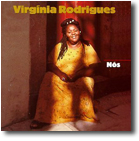Music |
Nos
Virginia Rodrigues
By
Published: Feb 12, 2023
Category:
World
Virginia Rodrigues was in her 30s. A manicurist. Professional status: singing Bach in a church choir. Then she got the part of a deaf mute in a play. Not much to do until the end, when she was supposed to find her voice and sing gloriously.
The director of the play was a friend of the great Caetano Veloso. He asked Veloso to come to the dress rehearsal — he hinted a surprise was in store.
The surprise: the song at the end of the play was a Veloso favorite. And the singer? Another surprise, maybe a bigger one. For she was sublime. Veloso wept.
And thus was launched the career of one of the most magical performers you will ever hear.
David Byrne, introducing a live performance, says: “You’ve never heard a voice like this.” To experience that performance, click here.
When I saw Virginia Rodrigues in concert, she wore a shiny silver gown of some space-age fabric and wrapped herself in a cape of the same material. The effect was unsettling — a Brazilian Aretha, with a big wild streak inside.
Her performance was even more unsettling. The music seemed formless, her voice was all over the map, the whole performance was like being on drugs. When it was over, we could feel ourselves returning to home base…slowly…slowly….ah, re-entry…landing.
Magic in, magic out. In Brazil, her mother sold fruit and vegetables in a street market; her father was an ice cream vendor. But the family had the good fortune to live in Salvador de Bahia,”the New Orleans of Brazil.” African music thrives there. So does the traditional music of Brazil.
Veloso couldn’t miss the “celestial” quality of her voice. It was pure. Innocent. “It transcends the distinction between erudite and popular,” he said. As well it might — hers is an operatic instrument used in the service of the commonplace. Well, hardly commonplace; even in Brazil, the blend of Yoruba culture, classical music and Brazilian pop is a total ear-opener. [To hear the full album of “Nos,” click here. To buy “Nos” from Amazon, click here.]
There is technical information about this music that’s beyond me. Like: much of her music is Carnival songs from Bahia — popular religious tunes from the Afro-Brazilian candomblé tradition. But Rodrigues changes the tempo, turning the songs inside out: religious music in a classical shell. ‘Nos’ was produced by a classical cellist — Rodrigues smartly covered her base.
The technical information availeth not. It matters less. A woman’s voice exploring the realms of sound — shimmering, silver, like mercury — is all you need to know.


